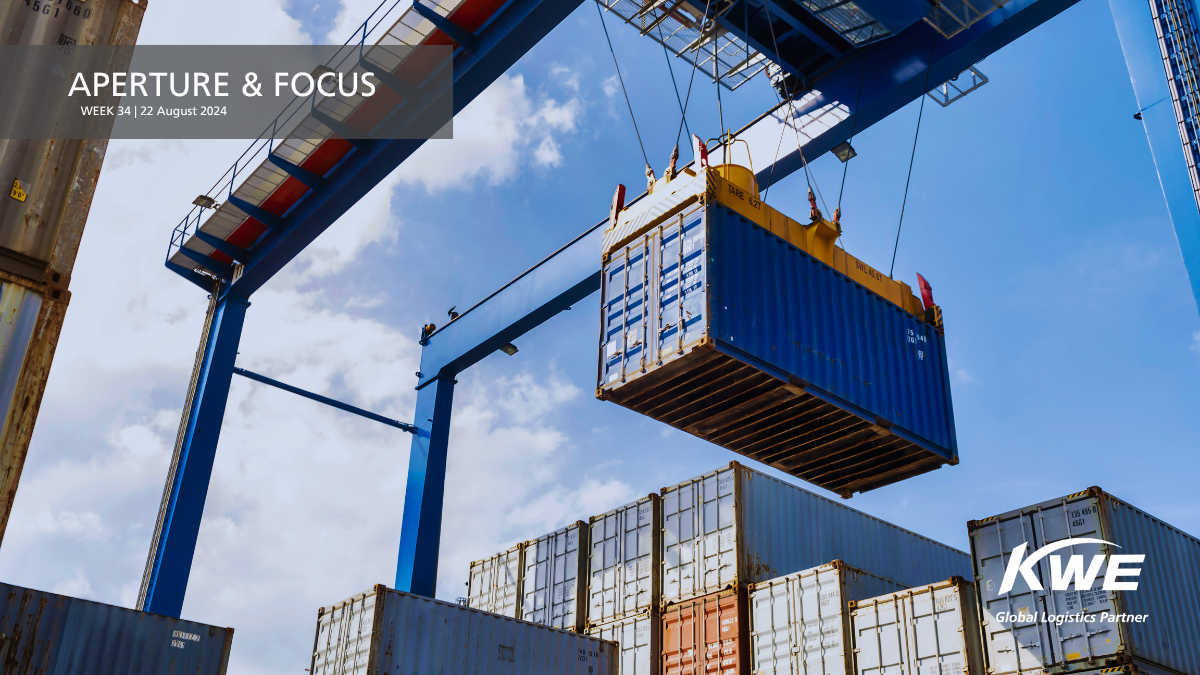Quote
Aperture & Focus 2024: Week 34

Global Aperture
Despite the deployment of numerous new container ships this year, the number of available vessels remains at a record low as carriers struggle to address schedule delays and manage essential maintenance. According to a recent survey, only 67 vessels were recorded as idle in August— just 0.6% of the global fleet, most of which are smaller ships under 2000 TEU. However, more capacity is on the horizon with around 1 million TEU expected to be delivered by the end of 2024 and an additional 2 million TEU by 2025.
Air cargo demand grew 13% year over year in July despite a global IT outage that caused significant flight delays and cancellations. The sector quickly recovered from the disruption, with high demand expected to continue through September, driven by e-commerce.
The digitization of dangerous goods as air cargo through online booking platforms faces challenges due to outdated systems and the complexity of compliance checks. However, advancements in technology and safety measures are gradually improving the reliability and security of transporting hazardous materials.
Regional Focus
Americas
United States: Dallas Fort Worth (DFW) International Airport launched the first U.S. air cargo centralized examination station (CES) on August 15th with direct access to the airport's Air Operations Area, streamlining cargo inspections by eliminating additional transport needs. This facility enhances the efficiency of processing international e-commerce shipments, using non-intrusive inspection technology to expedite clearance and ensure national security.
The Port of Long Beach and the neighboring Port of Los Angeles reported their busiest July ever, driven by strong import growth and efficient cargo movement ahead of peak shipping season. Additionally, the Port of Long Beach received federal funding for a new rail facility, which aims to expedite cargo movement across the nation, reduce congestion, and improve air quality by shifting more freight from trucks to trains.
Canada: As of 00:01 ET on August 22nd, CN has locked out TCRC-represented employees. This lockout has resulted in a complete halt of train movements within Canada and between Canada and the United States. The Vancouver Fraser Port Authority has implemented proactive measures to manage vessel arrivals and maintain cargo flow. These measures include adjusting ship arrival times to prevent congestion and managing anchorage assignments to ensure the safe movement of vessels. With two-thirds of the port's cargo reliant on rail, disruptions could severely affect the movement of containers.
Mexico: Construction has begun to build a second bridge to expand the Pharr-Reynosa International Bridge, which is a critical gateway for U.S. imports of Mexican produce. The expansion project has been ongoing since 2018, adding two more cargo truck lanes, additional inspection booths, and infrastructure to improve traffic flow and trade efficiency between the U.S. and Mexico.
Asia-Pacific
Bangladesh: The cargo backlog at Chittagong Port in Bangladesh is easing as shipping lines deploy additional vessels to address congestion. The situation has improved with increased container movements and new intra-Asia services planned, despite ongoing political instability.
India: A planned three-day strike by container transporters at Nhava Sheva Port has been postponed for two weeks following intervention from port authorities. The delay allows for the implementation of a new standard operating procedure aimed at improving payment processes and addressing operational delays.
Europe, Middle East & Africa
South Africa: A containership lost approximately 99 containers off the east coast of South Africa due to severe weather on August 19th, following a similar incident with another vessel last month. The South African Maritime Safety Authority (SAMSA) has issued a navigational warning and requested reports of any lost containers that may still be floating at sea.
Germany: The Port of Hamburg processed 3.8 million containers in the first half of 2024, maintaining stable container handling despite challenges in the Red Sea and moderate economic performance in Germany. Bulk cargo throughput declined due to a significant drop in coal handling, reflecting the ongoing energy transition and shift towards alternative energy sources.